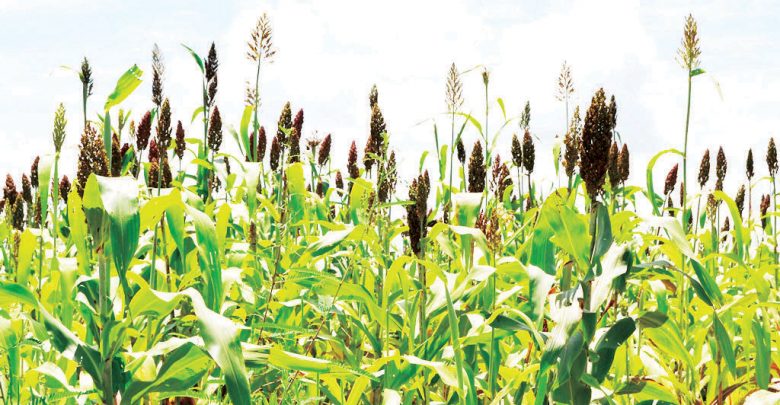Africa-Press – Zambia. Samuel Magwira, a 56-year-old smallholder farmer from Mpilisi Village in Sub Traditional Authority (ST/A) Mpilisi in Balaka District, is excited with the prospect of realising huge profits from his sorghum crop this year.
Magwira, who is a member of the National Smallholder Farmers Association of Malawi (Nasfam), says back-to-back drought years have encouraged farmers in the district to divert to the drought-tolerant crop, sorghum.
“When the district receives good rains, the majority of the smallholder farmers in Balaka grow cotton, groundnuts and soya beans, with sorghum featuring as a pastime agricultural activity,” he says. Malawi is an agro-based economy where an estimated 80 percent of the population relies on the sector to earn an income.
Yet, the sector continues to grapple with the adverse effects of climate change, which have eventually affected agricultural productivity as frequent droughts have led to crop failure and hence food insecurity and loss of income.
On the other hand, studies have shown that, in Malawi, the intensity of rains has increased, mainly in February and March, leading to floods and damage to established crop fields.
Such hazards have induced responsive measures undertaken by the farmers, government, and non-governmental organisations (NGOs) in order to reduce the negative consequences of food insecurity and loss of income.
However, to implement such responsive measures, extra costs are incurred and planning for this at both local and national level is urgently required. Over the years, Nasfam has been promoting crop diversification among its member farmers to enhance their resilience to the impacts of climate change and broaden their income base.
Nasfam Chief Executive Officer Betty Chinyamunyamu says sorghum is one of the crops they identified and they are currently promoting among their member farmers to enable them combat effects of climate change and build the farmers’ resilience.
“The association strives to optimize agricultural systems to combat and be resilient to climate change and enhance the health of our soil, water, and air through science-driven quantification approaches, policy leadership, coalition building and outreach. It is critical that as the effects of climate change take their toll on agriculture, the farmers should also start devising measures for adaptation, including adoption and use of drought-resistant crops such as sorghum,” she explains.
Sorghum is one of the crops, which have inherited its trait to adapt and grow in harsh climates from its origin. The crop grows in dry conditions, tolerates heat, salt and water logging, making it an ideal crop for semi-arid areas where most of our member farmers.
Additionally, sorghum crops have multiple uses as food, feed, fodder, and fuel. It also has many other industrial applications such as health, pharmaceutical diagnosis, packing, synthesis of organic molecules, and utility items have been in place.
Sorghum is also employed as pet feed for dogs and fish, among others. The crop is also known to be rich in phenolic compounds, many of which act as antioxidants.
Drought tolerance and lower crop input costs are some of the advantages that sorghum has over maize agronomically. It also has the advantage of being a maize substitute in livestock rations and ethanol production.
Studies have established that sorghum can positively impact livelihoods as the crop has potential to improve food security and income. It is not only an easy crop to produce, but also drought tolerant.
However, production of the crop in Malawi has fluctuated substantially in recent years. It tended to increase through 1970 to 2019 ending at 137,000 tonnes in 2019.
The farmers cited lack of access to seeds of improved varieties, poor production practices and lack of diversification, as farmers cling to traditional crops and lack of market as some of the challenges associated with low sorghum production in Malawi.
The association’s business manager (ABM) in Balaka Edward Mwale says the district has over 150 sorghum farmers. But only 32 of these grew the crop in the 2019/20 agricultural season.
The rest cited lack of market as the major reason they shunned the crop. Mwale discloses that the number has increased to 120 after the association clinched a business deal with Chibuku Products Limited (CPL).
In the deal, CPL has offered to buy 20 tonnes of sorghum from farmers in Balaka. The company has further challenged the smallholder farmers to produce even more in the coming years.
“We feel this is a huge boost to the sorghum farmers in the district,” muses Mwale.
Minister of Agriculture Lobin Lowe says smallholder farmers demonstrated the ability to adapt to climatic shocks through growing various crops in different periods of the year.
Lowe discloses that the farmers have diversified to growing other crops such as millet and sorghum, which have shorter growing periods and require less rain than maize, which is a deliberate climate-coping strategy. However, the minister admits that sorghum farmers are facing challenges to access markets for their crop.
“Lack of a reliable market for sorghum has been one of the longstanding concerns among farmers. But I can assure you that the incumbent government is working hard to create an environment where every crop should have its market,” says Lowe.







